





Martin Welch
Senior Research TechnicianSarah Barker
Post Doctorial AssociateStephen Dolan
Current students
Yassmin Abdelhamid
Audrey Crousilles
Eve Maunders
Alyssa McVey
Andre Wijaya
Emem Ukor-Keefer
Veena Mohan
Larson Grimm
Visiting researchers
Sean Bartlett
Xavier Chee
Rory Triniman
Yassmin Abdelhamid (PhD)
The type III secretion (T3SS) machinery is a well-known virulence determinant in Pseudomonas aeruginosa infections that is responsible for injection of exotoxins into the host cells. Generally, genes involved in the T3SS system are regulated by a cascade of interactions of four proteins (ExsE, ExsD, ExsC and ExsA) that eventually turns the secretion system on (free ExsA) or off (bound ExsA). The aim of my work is to understand the interactions and signals between these regulatory proteins. This will help us understand the pathogenesis and control mechanisms involved in Pseudomonas aeruginosa infections.
The study is fully funded by a Yousef Jameel Scholarship.
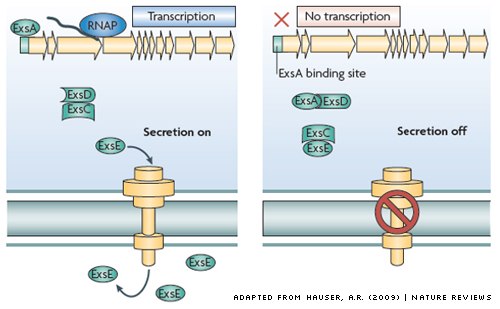
Chemical biology utilises small molecules as powerful tools to perturb and investigate biological systems, and the application of similar compounds in the selective treatment of disease states is a tenet of medicinal chemistry. My research spans these fields to further our understanding of the regulation of virulence determinants that contribute to bacterial pathogenicity. In this respect, we aim to produce selective chemical probes amenable to elaboration into novel antibiotics with well-defined targets. My other areas of interest include chemical approaches to the in situ detection of P. aeruginosa, structure-based drug design and diversity-oriented synthesis.
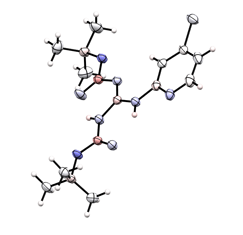
Audrey Crousilles (PhD)
Pseudomonas aeruginosa causes chronic and acute infections. During acute infections the bacteria uses the type III secretion system (T3SS), giving rise to tissue damage. T3SS was thought to be exclusively regulated by the host cell-bacteria interaction. However, recent work in the laboratory and elsewhere, has shown that this machinery is also tightly-regulated by metabolic inputs, which implicates the glyoxylate pathway. In this context, the aim of my project is to characterize the four enzymes involved at the branch point of the glyoxylate shunt and TCA cycle: isocitrate lyase (ICL), both isocitrate dehydrogenases (ICD and IDH) and isocitrate dehydrogenase kinase/phosphatase (AceK). These enzymes have been explored in E. coli and other organisms, however little is known about them in P. aeruginosa. Moreover, the established connection with T3SS and the inhibitory effect of ICL inactivation (similar to ICL inhibitors) on it may confirm the potential of this pathway as a possible target for small molecule-mediated antimicrobial intervention.
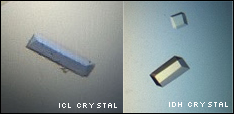
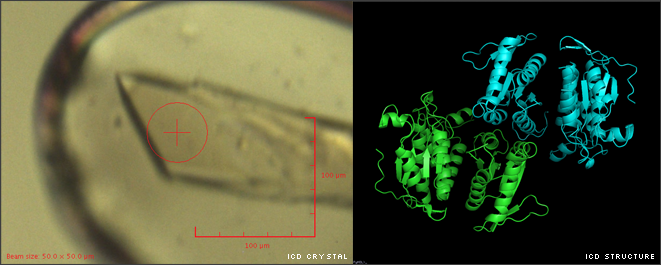
Pseudomonas aeruginosa is an opportunistic human pathogen known to infect the lungs of cystic fibrosis sufferers. Chronic infection is associated with a sessile mode of growth known as a "biofilm" which exhibits high resistance to antibiotic treatment. It is still not clear what causes P.aeruginosa to adopt the biofilm form of growth and so my project is attempting identify regulators of biofilm formation to better understand what triggers the transition from the antibiotic sensitive, "planktonic" growth form to the resistant biofilm mode of growth. Understanding regulation of biofilm formation is important in developing an effective treatment P.aeruginosa infection.
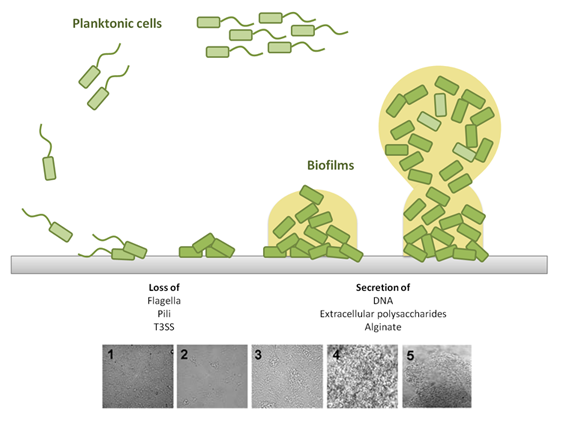
© Copyright 2014-2015 Martin Welch Lab
